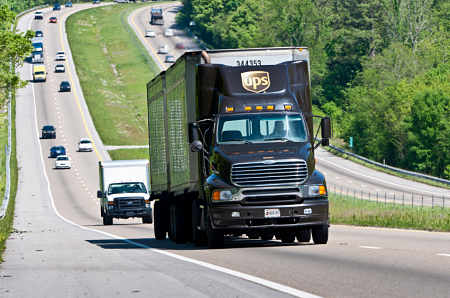UPS to build additional CNG fueling stations and expand fleet
United Parcel Service (UPS) is continuing to make investments in natural gas as a fuel source for its fleet of vehicles.
UPS recently announced plans to build 15 compressed natural gas (CNG) fueling stations to support the purchase and planned deployment of 1,400 new CNG vehicles over the next year.
Twelve of the CNG stations will be in new natural gas vehicle deployment areas, and three will replace existing CNG stations with more robust, higher capacity equipment.
This purchase represents a nearly 30 percent increase to UPS’s current industry-leading alternative fuel and advanced technology fleet of 5,088 vehicles worldwide. The CNG fueling stations and vehicle purchases are part of UPS’ ongoing commitment to diversify its fuel sources, implement a fleet infrastructure with lower tailpipe emissions and increase experience using alternative fuels in freight transport applications.
“UPS’s investment in a large scale alternative energy fleet has enabled the company to avoid more than 34 million gallons of conventional fuels since 2000,” said Mitch Nichols, UPS senior vice president of transportation and engineering. “Today’s CNG announcement demonstrates UPS’s plans to expand use of widely available natural gas. CNG is an important building block in our long-term fleet strategy and offers environmental and economic advantages.”
When the deployments are complete, UPS anticipates its alternative fuel and advanced technology fleet will log more than 350 million miles per year, supporting the company’s goal of driving one billion miles in this fleet by the end of 2017. This will displace approximately 54 million gallons of conventional diesel and gasoline annually while reducing total vehicle emissions. According to the U.S. Department of Energy, the use of natural gas instead of gasoline cuts greenhouse gas emissions by 6-11 percent over the fuel life cycle.
Transparency Market Research released a new market report titled, “Compressed Natural Gas (CNG) Market – Global Industry Analysis, Size, Share, Growth, Trends and Forecast 2014 – 2020.”
According to the report, the global CNG market was valued at $56.32 billion in 2013 and is expected to increase in value to $126.19 billion by 2020.
UPS plans to deploy new CNG vehicles in 15 cities. The cities are Atlanta, Ga.; Charleston, W.Va.; Dallas, Texas; Denver, Colo.; Doraville, Ga.; Lenexa, Kan.; Lexington, Ky.; Montgomery, Ala.; New Orleans, La.; New Stanton, Pa.; Oklahoma City, Okla.; Port Allen, La.; Shreveport, La.; Richmond, Va., and Roanoke, Va.
Currently UPS has a total of eight CNG fueling stations in California, Colorado, Georgia and Oklahoma and operates CNG vehicles in Germany, the Netherlands and Thailand.
Using a “Rolling Laboratory” approach, UPS is one of the leaders in the industry developing the cleanest, most effective pathways to support the company’s effort to reduce emissions and dependence on fossil fuels while improving efficiency. The first package delivery company to introduce alternative fuel tractors into its fleet, UPS operates one of the largest private alternative fuel and advanced technology fleets in the U.S. Its fleet includes all-electric, hybrid electric, hydraulic hybrid, CNG, LNG, propane, biomethane and light-weight fuel-saving composite body vehicles.
UPS collaborates with various stakeholder groups to identify and promote transportation solutions that enhance the sustainability of emerging fuel choices. In 2012, UPS helped BSR (Businesses for Social Responsibility) launch Future of Fuels, a working group that promotes the development of lower-emission fuels for transportation. The group’s objective is to study the impacts of all fuel sources to help guide businesses in deploying alternative fuel vehicles in their fleets.
UPS’s sustainability initiatives are focused in four strategic areas: environmental responsibility, economic enhancement, empowered people and connected communities.
The U.S. Energy Information Administration (EIA) administrator, in his March report to the Committee on Energy and Natural Resources of the U.S. Senate, said EIA analysis shows that during the next 25 years, natural gas will grow dramatically in use by freight trucking and other commercial transportation modes.






